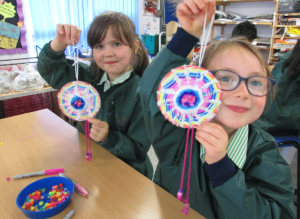However, as children grow, focus shifts to other areas of development – learning to read and write, add and subtract, then onto individual pursuits if a talent is spotted, and eventually those all-important career goals. As exploration gives way to structure, art and the enrichment it offers can end up being over-looked.
Decreases in funding for creative subjects in state schools is a frequent topic of discussion in the media and art’s value as a subject continues to come under scrutiny. So, what are the benefits of studying art and how can it enhance your child’s education?
Self-expression
“Art is about putting yourself on the line and having the confidence to be creative,” explains Kate O’Hare, Head of Art at Trent College. “It’s about taking risks and showing bravery. Students learn to have an opinion and not just follow the crowd.”
We are free to explore ourselves through art without limitation or the fear of judgement. This can be especially important for young people, for whom art can provide an emotional outlet during a period of life often defined by constant change and development.
Skills that transcend the studio
The self-discipline and focus that goes into seeing a piece of work through – from the initial research and ideas stage, through the analysis and deconstruction of source material, to employing different techniques to create something unique and personal – are skills valuable beyond the art room.
Kate O’Hare recalls a story of a surgeon who studied art because the concentration and time required to invest in a piece of work are skills that are also integral to surgery. Art students at Trent College have gone on to study everything from physics and maths to journalism, as well as pursuing art-based and design careers. Far from limiting future career options, art has the potential to expand them!
Diverse range of interests
The competitive nature of higher education means that the UK’s top universities are increasingly looking for that something extra from prospective students. When only one course place is remaining and two applicants have the same predicted A Level grades, what becomes the deciding factor? An applicant with a proven passion for art is more likely to make an impression than one without any interests beyond the academic. Commitment to a hobby or extracurricular activity demonstrates a focused and self-motivated character, the type of person that will thrive in a university setting.
A healthier life
Art does not have to be a career choice or even a GCSE option. Novice or pro, anyone can enjoy the benefits of art. When creating art, we become fully immersed in a creative process. This focus in the moment bears similarities to the practice of mindfulness, which has been proven to relieve stress and improve mental health and well-being. Combine these benefits with the fulfilment and pride that comes with finishing a creative piece and it is easy to see how art can have a positive impact on our lives.
The next generation
Inspiration is everywhere, and access to new artists and techniques is now available at the swipe of a phone screen. The dynamic nature of art and its expansion into new mediums, such as computer-generated art, will ensure it remains relevant in our ever-evolving technological society. It is time to start encouraging young people to reconnect with their instinct for artistic exploration and discover the true value of art for themselves.


